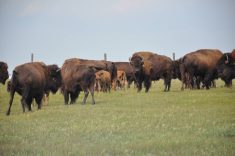Livestock producers in Ontario are losing faith in Canada’s justice system.
On May 1, the crown attorney’s office in London dropped charges against a woman who broke into a hog barn several times and stole piglets from the barn.
The decision shocked farmers and producer groups in the province because the activist admitted she entered the barn near Lucan, Ont., and acknowledged taking the pigs.
“It’s one thing for people to have opinions on animal husbandry and how things are being done (on farms). It’s another thing to conduct illegal activities,” said Keith Currie, president of the Ontario Federation of Agriculture.
Read Also

Canadian Food Inspection Agency extends chronic wasting disease control program consultation deadline
Date extended for consultation period of changes to CWD program
“Clearly this was break and enter. This was theft of animals, literally, off the farm. And yet our courts aren’t upholding the law.”
Jenny McQueen, an anti-meat campaigner, was charged with break and enter and mischief after recording video of the pigs and conditions inside the barn. She was in the video, so there’s no doubt that she broke into the weanling barn.
McQueen told the Toronto Star in November that she’s part of a group that does open rescue — trying to liberate animals from bondage.
“All we were trying to do was help the animals,” she said, explaining the repeated visits to the Lucan pig barn.
Kurtis Andrews, an Ottawa lawyer who specializes in farm and animal welfare matters, was “outraged” by the crown’s decision that there was no reasonable prospect of conviction.
“What we are witnessing is nothing short of a breakdown of law and order,” Andrews wrote in an open letter to Ontario attorney general Caroline Mulroney.
“No matter what your beliefs happen to be, it is unacceptable to provide radical activists with a free pass to break the law.”
These sort of incidents, where activists enter livestock farms without permission, are becoming commonplace in Ontario.
In March, a group of protesters showed up at a dairy and barged into the barn, even after the producer told them to stop.
“The farmer said, ‘you’re not allowed to come on my property,’ and they said, ‘yes, we are,’ ” said Kelly Daynard, executive director of Farm & Food Care Ontario.
Currie is worried because people in the farm community are furious with the court’s unwillingness to prosecute activists.
“The risk (of violence) just got more real after this decision,” he said.
“That’s the frustration level we’re getting to, where farmers are really being left without any other choice but to try and defend themselves and their property…. Someone is going to get badly hurt, I’m afraid.”
















